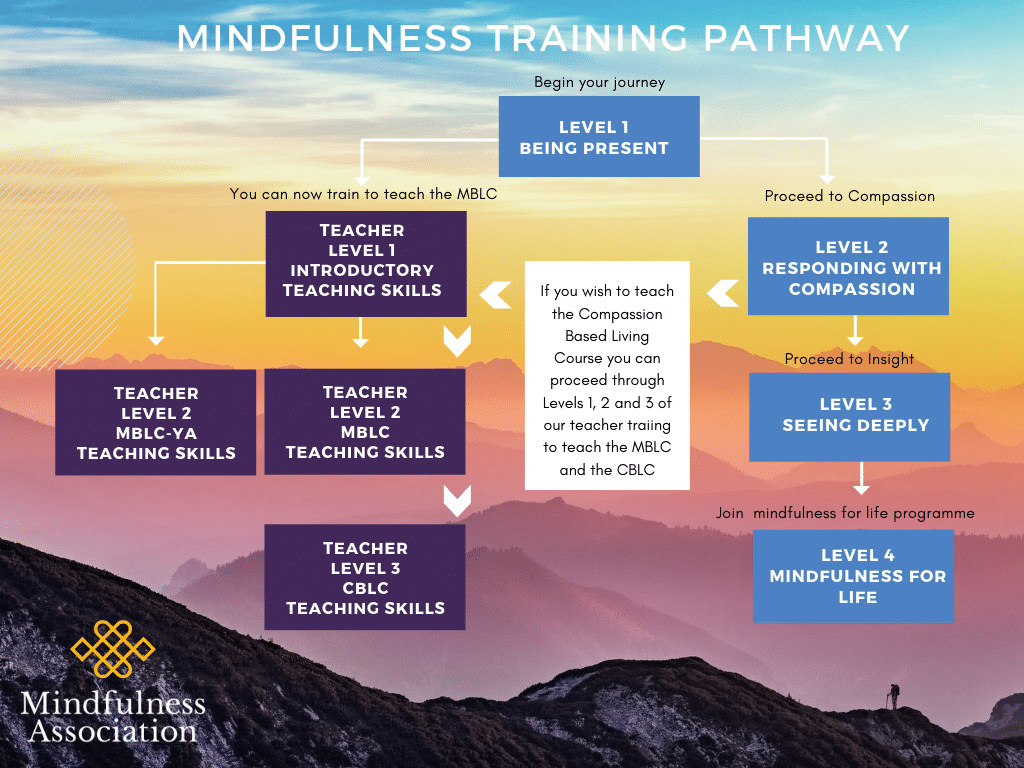
The MBLC-YA is designed to be facilitated over 10 sessions of approximately 40 minutes to 1hr duration, one session per week, with pupils of secondary school age, i.e. 11-18 years old, or college age, i.e. 18-21 years old, and is based on the Mindfulness Association’s adult 8-week Mindfulness Based Living Course (MBLC) with some important modifications such as information about the developing brain. Each session of the MBLC-YA is accompanied by a PowerPoint to illustrate the main teaching points, however it is intended that each lesson is highly experiential.
The teacher training is in three parts over a duration of approximately 8 weeks.
Part 1: a 1-day online group training focused on key elements to support participants to begin delivering sessions of the course to each other.
Part 2: participants watch lesson videos in which the creator of the course, Dr Heather Bond, models its delivery. Just like a young MBLC-YA participant, trainee teachers follow the daily meditation practices and exercises from the course. They will also meet in peer groups to guide each other through the course, provide feedback and journal their experience.
Part 3: a 3-day online group training that aims to support participants to confidently deliver our young person’s curriculum that’s known as the Mindfulness Based Living Course for Young Adults (MBLC-YA).
Participants will receive links to the Teacher Manual, the Student Manual, and 10 lesson PowerPoints. There is an MBLC-YA app that includes the practices from the course, that is available on both Android and iOS platforms.
During the training, participants are afforded the opportunity to practise delivering sessions in a safe and encouraging environment. For those who are already teaching adults, but not young people, the training will also highlight the differences to be aware of when working with adolescents. This teacher training is open to those who have completed both weekends of Teaching Level One, including those not already working in schools.
Pre-requisites for delivery of this course include completion of the Mindfulness Association‘s ‘Mindfulness – Level 1’ training, which is delivered over 4 weekends, spread out over approximately 9 months, followed by the ‘Teaching Level 1‘ course, which is delivered over two weekends and, finally, attendance at the 3-day MBLC-YA teacher training.
Choose your Level 2 YA Train to Teach Course
Course Information
The Mindfulness Based Living Course for Young Adults (MBLC-YA) is the Mindfulness Association‘s 10-week curriculum for 11-18 year-olds that is based on our Mindfulness Based Living Course (MBLC) for adults. The course introduces the concepts of mindfulness for teens as well as self-compassion and aims to develop these qualities in students through classroom-based practices and activities designed for this age group.
“This course has helped me better understand and embody the MBLC course and to trust in myself as a teacher.”
If you have engaged in mindfulness training yourself and feel you have benefited, then what a wonderful opportunity to help share the benefits of mindfulness practice with others so they benefit too. As part of your mindfulness training, you may have noticed a personal transformation in terms of managing your own stress levels and increased wellbeing. By training to teach the 8-week Mindfulness Based Living
Course, we can help others to relieve their stress, manage pain and chronic illness, achieve their full potential and really flourish in their lives. By going through the teacher training and sharing the benefits of mindfulness with others our own practice and understanding of mindfulness grows. In turn, our practice deepens, and we reap the benefit too.
After completing the Level Two training you can proceed to take the MBLC for adults and the Level 2: Responding with Compassion before going on to do the Train to Teach Level 3 CBLC.
Please check individual retreats at the bottom of this page for the exact costs and times.
Teacher Training Information
Our Mindfulness for teens courses, also known as MBLC for Young Adults consists of 10 sessions. Delivered usually at a rate of 1 per week, each session lasting from 40 minutes to 1hr.
Each session explores themes such as ‘Your amazing mind’ (which looks at the developing adolescent brain with its different trajectories of emotional development and development of executive function and explains that our brains are hardwired for survival rather than happiness, so these tricky minds are ‘not our fault’), ‘Staying present’, ‘Dropping anchor’ into the present moment (using the support of breath, body or sound), distraction, attitude, appreciation, and what it might mean to live a mindful life – one that is in alignment with what we value.
Each session is accompanied by a PowerPoint presentation, and self-compassion (i.e. directing kindness towards ourselves then things are difficult) is woven throughout the fabric of the course. A comprehensive student manual accompanies the course in addition to a wide variety of online recorded practices for students to access.
Have you completed the Mindfulness Level 1 – Being Present training with the Mindfulness Association?
This course is designed for those who have completed at least the Mindfulness Level 1 training and is a foundation for those who wish to go on to do the MBLC teaching skills retreat to learn to teach our 8 week MBLC course.
Are you already a mindfulness teacher?
If you have already trained to teach mindfulness, for example in MBSR or MBCT, and would like to train to teach our 8 week Mindfulness Based Living Course (MBLC) you will need to complete an MBLC 8 week course or attend at least weekends 2 and 3 of the Level 1 Mindfulness Training: Being Present in order to familiarise yourself with aspects of the MBLC curriculum which are not present in MBSR or MBCT before completing the MBLC Retreat.
“The dedication and the compassion of the tutors was overwhelming. The course structure was excellent. The energy of the group – awesome.”
- The Mindfulness Association has nearly 10 years of experience of delivery courses in the UK and Europe.
- All our tutors are very experienced and knowledgeable compassion-based mindfulness and practitioners.
- We have a membership providing our practitioners and teachers with ongoing support.
- We provide a range of workshops and online sessions for mindfulness teachers to continue their professional development (CPD).
- Our tutors and courses comply with the UK Network for Mindfulness-Based Teacher Training Organisations who oversee the quality of mindfulness-based training in the UK.
- Our fully trained supervisors are available to support teachers through their training and when teaching.
“Immersive, deep learning and a true inspiration to be a part of the community of the MA”
Our mindfulness courses provide an in-depth, personal, experiential practice of mindfulness that are part of a lifelong journey. We learn how to be present, respond with compassion and see deeply into our thoughts, feelings and behaviours. This three-tiered approach enables you to embody your practice as a way of life. We also provide:
- Mindfulness teacher training
- Compassion teacher training
- Annual mindfulness practice retreats
- The opportunity to study mindfulness in depth on the MSc Studies in Mindfulness in partnership with The University of Aberdeen.
- Weekend workshops for Continued Professional Development for Mindfulness teachers.
Our training is based on the work of Rob Nairn. Rob is one of the world pioneers in presenting meditation training in a way that is accessible to the Western mind. He was asked to teach meditation by the Dalai Lama. His experience of over forty years of teaching meditation to Westerners has enabled him to develop a unique secular training in mindfulness, and so the Mindfulness Association was created to support this.
We are one of the top mindfulness training providers in the UK. We have been delivering 100s of compassion-based mindfulness meditation courses over 10 years across the UK and Europe.
All our courses are secular and draw from a broad range of disciplines, including neuroscience, evolutionary psychology and Buddhism.

